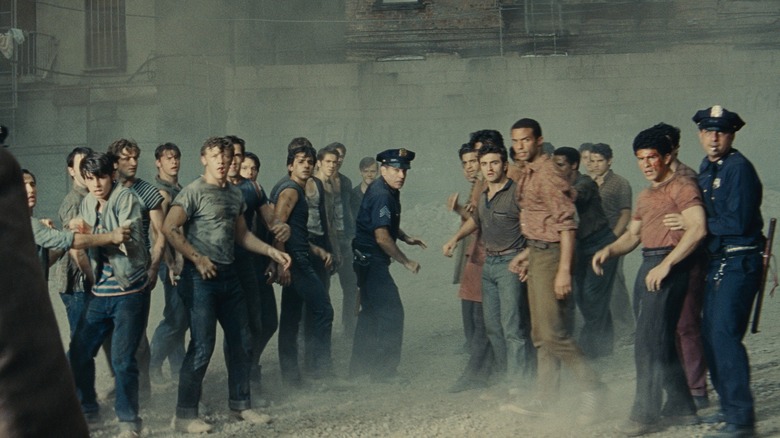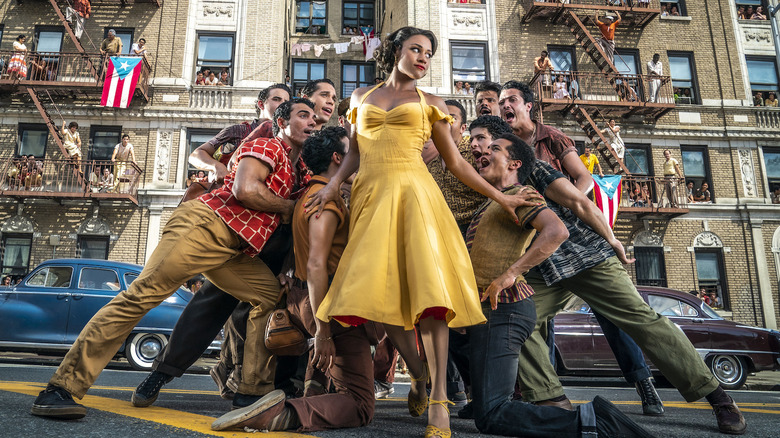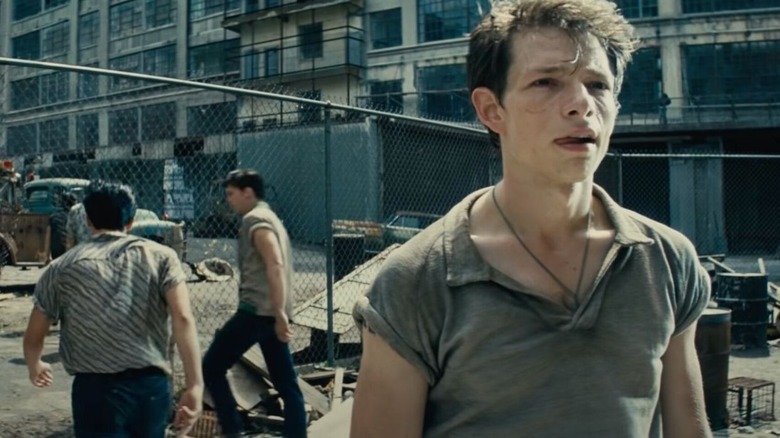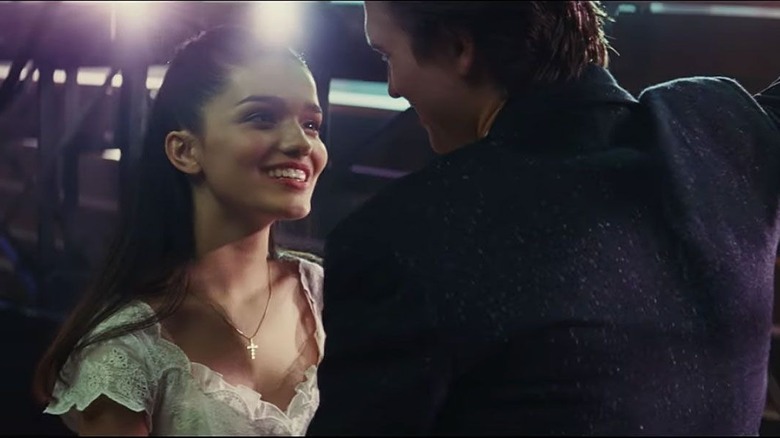West Side Story Ending Explained: Even Death Won't Part Us Now
Tonight, tonight, it all begins toniiiiiight, as "West Side Story" is finally out in theaters. There were plenty of skeptics when Steven Spielberg announced he was tackling the musical theatre juggernaut known as "West Side Story," the beloved stage production turned into a classic film from Jerome Robbins and Robert Wise. Despite having never directed a musical before, Spielberg blew away expectations and breathed new life into the iconic retelling of "Romeo and Juliet" set to the remarkable music of Leonard Bernstein and Stephen Sondheim.
Despite its iconic legacy, the 1961 film version of "West Side Story" has, uh, some serious problems, to put it lightly. Ernest Lehman wrote the script for the original film, but Spielberg nabbed celebrated playwright and screenwriter Tony Kushner ("Angels in America," "Caroline, Or Change," "Munich," Lincoln") to give the story a bit of an update. Actress Rita Moreno, the only returning player from 1961's film, even collaborated with Kushner and Spielberg to ensure the film was respectful and authentic to the Puerto Rican communities presented in the film. Moreno won an Oscar for her portrayal as Anita (now played by the movie-stealing Ariana DeBose) and signed on as an executive producer in addition to her new version of Valentina in the film. The changes to "West Side Story" aren't limited to sucking out some of the problematic elements, with the ending changing slightly as well. Snap your fingers, point your toes, and get ready to cross into spoiler territory, because this is the ending of "West Side Story" explained.
'We Gotta Show Them Who's On Top!'
As "West Side Story" is a retelling of "Romeo and Juliet," we set the stage in New York City where rival street gangs, the Jets and the Sharks, are in a constant feud during Robert Moses' "urban renewal" projects (see: gentrification), which adds a much more grounded tone to the original film's conflict existing moreso as — I don't know — "generalized gang turf war and racism." The new "West Side Story" is far more aware of the racial overtones happening between the two gangs, a low bar considering the original is a proud and flagrant display of brownface. The Jets are angry and motivated by mismanaged anger and resentment, while the Sharks are clearly on the defense and just looking to survive. There's a distinct power imbalance between these two gangs, something the new film acknowledges while the original tried to pretend the two were on even jeté'd footing. Everything changes, however, when Tony (Ansel Elgort who is outperformed by literally everyone, including background performers) and Maria (Rachel Zegler, who is electrifying) fall in love at first sight, but separated by the barriers of their affiliations with the rivaling gangs.
As to be expected, Tony and Maria's love doesn't magically solve the systemic racism, poverty, police brutality, and housing displacement that has pitted the two groups against one another in the first place, and the in-fighting war rages on, leading to the deaths of some of the gang's leaders and, well, it is a re-telling of "Romeo and Juliet" after all...
What's Different? Who Dies?
Riff dies.
Bernardo dies.
Tony dies.
Riff (Mike Faist) is the first one to go (RIP my sweet lil' twink) during the rumble, stabbed to death by Bernardo (David Alvarez). Tony had previously tried to make amends with Bernardo since he's Maria's brother and Tony is in love with his sister, but Bernardo has been scorned too many times by the Jets and doesn't want him anywhere near her. The rumble goes down, Tony is forced to fight back, and in the heat of the moment and in partial retaliation for Riff's death, Tony kills Bernardo. An interesting change is that typically, the song "Somewhere" is sung by Tony to Maria after she finds out he killed Bernardo, but in the new film, is sung by Rita Moreno's Valentina instead, and it is infinitely more heartbreaking. Kushner ... why did you do that to us?! Other songs like "Cool" are flipped to take place before the rumble instead of after, and there's a much heavier emotional weight to it all. Thanks, Spielberg. Now we all need Kleenex.
The Ending of West Side Story
In addition to Bernardo being Maria's brother, he's also the absolute love of Anita's life. Anita has fully bought into the American dream, and Bernardo's death, paired with her own attempted assault at the hands of the Jets has completely shattered her reality. Filled with rage, heartbreak, and anger, Anita helps spark the retaliation that leads to Chino (who also has a thing for Maria) shooting Tony. She connects with the Jets and lies by saying Chino has killed Maria, knowing that this news will draw Tony out and make him an easy target for Chino. When he comes out, he sees Maria, alive and holding a suitcase intending for them to run away together, but Chino ultimately shoots Tony and he dies in Maria's arms as she sings lines from "One Hand, One Heart."
Fortunately, as this is not "Romeo and Juliet," Maria does not take her own life, and instead, the Jets and the Sharks are left to mourn collectively those that they have lost and now must realize the severity of their rivalry and try to figure out how to move forward.



